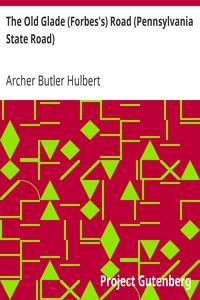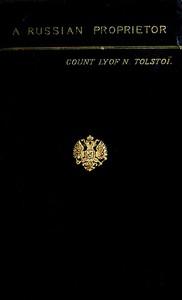Read this ebook for free! No credit card needed, absolutely nothing to pay.
Words: 35290 in 8 pages
This is an ebook sharing website. You can read the uploaded ebooks for free here. No credit cards needed, nothing to pay. If you want to own a digital copy of the ebook, or want to read offline with your favorite ebook-reader, then you can choose to buy and download the ebook.


: The Old Glade (Forbes's) Road (Pennsylvania State Road) by Hulbert Archer Butler - United States History French and Indian War 1754-1763; Forbes Road (Pa.)
mediately replied "... there is no Waggon Road from Carlisle West through the Mountains but only a Horse Path, by which the Indian Traders used to carry their Goods and Skins to and from the Ohio while that Trade remained open." Though Morris usually made requests of the assembly in vain, the request concerning this road was granted, and Morris was empowered, in the middle of March, to open a road "through Carlisle and Shippensburg to the Yoijogain, and to the camp at Will Creek." He immediately appointed George Croghan, John Armstrong, James Burd, William Buchannan, and Adam Hoops to find a road to the three forks of the Youghiogheny--or "Turkey Foot" as the spot was familiarly known on the frontier. On April 29 Burd reported as follows to Morris: "... We have viewed and layed out the Roads leading from hence to the Yohiogain and the camp at Will's Creek, and enclosed You have the Draughts thereof.... We have dispersed our Advertisements through the Counties of Lancaster, York, and Cumberland, to encourage Labourers to come to Work, and We intend to set off to begin to clear up on Monday first." Thus, slowly, the Old Trading Path was widened into a rough roadway westward from Carlisle. On May 26, John Armstrong wrote Governor Morris that there were over a hundred choppers at work. Five days later Burd wrote Richard Peters that there were one hundred and fifty at work; but he adds, ominously: "The People are all anxious to have arms, and if You can procure me arms I would not trouble the General for a cover; but if you can't they will not be willing to go past Ray's Town without a guard." Little wonder: the van of Braddock's army had struck westward into the Alleghenies the day before this was written, and already the woods were full of spies sent out by the French, and many massacres had been reported. The horses and wagons which Franklin had secured for Braddock comprised almost his whole equipment. These had gone to Fort Cumberland by the old "Monocasy Road" and Watkins Ferry.
On the twelfth of June Allison and Maxwell wrote Richard Peters that "Sideling Hill," sixty-seven miles west of Carlisle, and thirty miles east of Raystown, "is cut very artificially, nay more so than We ever saw any; the first waggon that carried a Load up it took fifteen Hundred without ever stopping;" there were, however, many discouragements--"for four Days the Labourers had not one Glass of Liquor!" On June 15 William Buchannan reported that the road was cleared to Raystown. But some of the wagons were "pretty much damnified." On the seventeenth Edward Shippen wrote Morris from Lancaster: "I understand Mr. Burd has cut the Road 5 Miles beyond Ray's Town, which is 90 Miles from Shippensburg." On the twenty-first General Braddock wrote as follows to Governor Morris from Bear Camp : "As it is perfectly understood here in what Part the Road making in your Province is to communicate w^ that thro' w^ I am now proceeding to Fort Du Quesne, I must beg that you and Mr Peters will immediately settle it, and send an express on Purpose after me with the most exact Description of it, that there may be no Mistake in a Matter of so much Importance." On July 3 Morris wrote Burd, who was in command of the working party, concerning this request of Braddock's. He takes it "for granted ... that the Road must pass the Turkey Foot ... and that there cou'd be no Road got to the Northward." Under such circumstances he affirmed that the nearest course to Braddock's Road would be a straight line from Turkey Foot to the Great Crossings of the Youghiogheny . He asked Burd to settle this point and send his decision immediately to Braddock.
The working party on the Pennsylvania road was attacked early in July and needed every one of the five score men whom Braddock had been able to spare for their protection.
The news of Braddock's defeat came slowly to the cutters of this historic roadway from central Pennsylvania to the Youghiogheny. On Tuesday night, July 15, a messenger was sent to them from Fort Cumberland, who arrived the night of the day the above letter was written. Dunbar wrote Morris from "near ye great Crossings" on the sixteenth: "I have sent an Express to Captain Hogg, who is covering the People cutting Your New Road, as I can't think his advancing that Way safe, to retire immediately." Burd reported to Morris from Shippensburg July 25, that his party had retreated to Fort Cumberland from the top of Allegheny Mountain July 17; "St Clair told Me," he added, tentatively, "that I had done my Duty." He had left before Dunbar's messenger had arrived.
Such is the first chapter of the story of the white man's occupation of the Old Trading Path and the Old Glade Road--the name commonly applied to the portion which Burd opened from the main path from where it diverged four miles west of Bedford to the summit of Allegheny Mountain. This branch was also known as the "Turkey Foot Road." The Old Trading Path was now a white man's road from Carlisle to Bedford and four miles beyond. But the tide of war now set over the mountains after Braddock's defeat, putting an end to any improvement of the new rough road that was opened. Yet not all the ground gained was to be lost. Governor Shirley, now in command, wildly ordered Dunbar to move westward again to retrieve Braddock's mistakes, but sanely added, that, in the case of defeat "You are to make the most proper Disposition of his Majesties' Forces to cover the Frontiers of the Provinces, particularly at the Towns of Shippensburg and Carlisle, and at or near a place called McDowell's Mill, where the New Road to the Allegheny Mountains begins in Pennsylvania, from the Incursions of the Enemy until you shall receive further orders."
Was this a hint that Braddock had been sent by a wrong route and that his successor would march to Fort Duquesne over the Old Trading Path?
A BLOOD-RED FRONTIER
There is no truer picture of the dark days of 1755-56 along the frontiers of Pennsylvania and Virginia than that presented in the correspondence of Washington at this time. A great burden fell upon his young shoulders with the failure of the campaigns of 1755. Though far from being at fault, he suffered greatly through the faults and failures of others. The British army had come and had been routed. Now, after such a victory as the Indians had never dreamed possible, the Virginia and Pennsylvania frontiers, five hundred miles in length, lay helpless before the bands of bold marauders drunk with the blood of Braddock's slain.
The young colonel of the remnant of the Virginia Regiment took up the difficult task of defending the southern frontier as readily as though a quiet, happy life on his rich farms was an alternative as impossible as alluring. But perhaps a bleeding border-land never in the world needed a twenty-three year old lad more than Virginia now needed her young son. A flood-tide of murder and pillage swept over the Alleghenies. The raids of the savages brought the people to their senses, as the most terrible of tales came in from the frontier. But soon the question arose, "Where is the frontier?" The great track Braddock had opened for the conquest of the Ohio valley became the pathway of his conquerors, and soon Fort Cumberland, the frontier post, was far in the enemies' country. The Indians soon found Burd's road on the summit of the Alleghenies and poured over it by Raystown toward Carlisle and Shippensburg. Each day brought the line of settlements nearer and nearer the populous portions of Virginia and Pennsylvania, until Winchester became an endangered outpost and fears were entertained for Lancaster and York. Hundreds now who had refused the despairing Braddock horses and wagons saw their wives and children murdered and their homesteads burned to the ground.
Whether Dunbar did right or wrong in hurrying back to Virginia, it was a bitter day for Virginia and Pennsylvania. When his army hastened from the frontier, it became the prey of the foes whose appetite that army had whetted. Yet Shirley, reconsidering his former scheme, ordered Dunbar to New York. After drawing the full fire of the French and Indians upon Virginia and Pennsylvania, this army was sent to New York.
Looking backward, with the stern years 1775-82 in mind, it is easy to see that then, in 1755, Pennsylvania and Virginia were to be put through a hard school for a glorious purpose. They were to be trained in the art of war. Of it they had known practically nothing. They had no effective militia. Of military ethics they had no dream. They knew not what obedience meant and could not understand delegated authority. Their liberty was license or nothing. Of the power of organization, concentration, discipline, routine, and method they were almost as ignorant as their redskinned enemies. Although the men of New England had not been given such great obstacles to overcome, it is undoubtedly true that their militia was far more adequate than anything of which Pennsylvania or Virginia knew, at least until 1758. And yet Braddock died cursing his regulars and extolling the colonials!
Not the least of his trials--undoubtedly the most discouraging--was the faithlessness of the troops sent out by Governor Dinwiddie upon the reeking frontier. Many of them were themselves panic-stricken and fled back with the rabble. The whole militia regime was inadequate; there was no authority of sufficient weight vested in the commanding officers to enable them to deal even with insolence, much less desertion. "I must assume the freedom," Washington wrote the governor, "to express some surprise, that we alone should be so tenacious of our liberty as not to invest a power, where interest and policy so unanswerably demand it.... Do we not know, that every nation under the sun finds its account therein, and that, without it, no order or regularity can be observed? Why then should it be expected from us, who are all young and inexperienced, to govern and keep up a proper spirit of discipline without laws, when the best and most experienced can scarcely do it with them?"
Free books android app tbrJar TBR JAR Read Free books online gutenberg
More posts by @FreeBooks

: Histoire de la Littérature Anglaise (Volume 5 de 5) by Taine Hippolyte - English literature History and criticism France; FR Littérature


: Annette Laïs by F Val Paul - Actresses Fiction; Nobility France Fiction; French fiction 19th century FR Littérature




